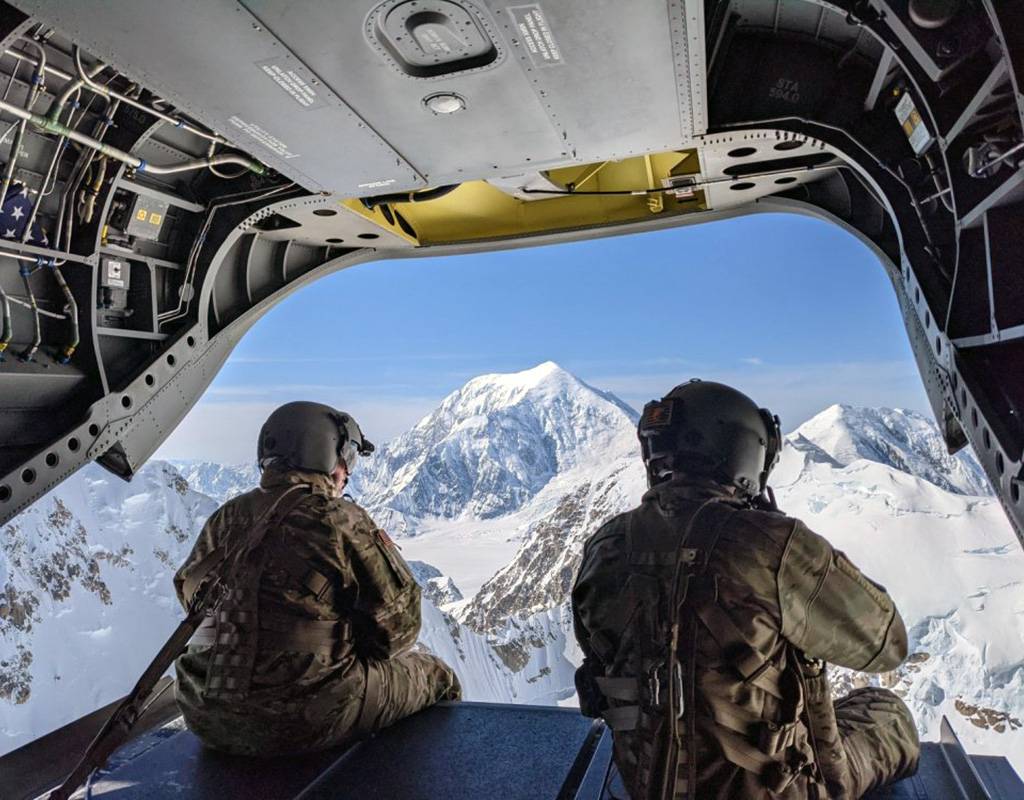
Towering over the landscape at 20,308 feet in height, Denali is the tallest mountain in North America, making it a popular target for mountain climbers. The goal of the National Park Service is to ensure a safe climbing season for all of them, and the soldiers of Bravo Company, 1st Battalion, 52nd Aviation Regiment, provide support in making that happen.
“We put infrastructure in at the beginning of the season that helps us keep the mountain clean and lets us perform rescue operations in a complicated and dangerous environment. We put camps in at 7,200 feet and 14,000 feet. The Army helps us get the gear in and take it back out at the end,” said Tucker Chenoweth, the South District Ranger for Denali National Park.
The Soldiers and Chinook helicopters that provide that assistance are from 1-52, based out of U.S. Army Garrison Alaska, Fort Wainwright. Without their help, the set-up would be much costlier and more time-consuming.
“They’ve been deployed a few times during the mission, and we had to use local air taxis,” said Chenoweth. He noted that the air taxis are more expensive to rent and have a much smaller carrying capacity than the CH-47s, so it takes them approximately eight trips to bring the gear to 7,200 feet, while two Chinooks can get it all up there in one trip.
“The Chinooks can each take up 10,000 pounds up to 7,000 feet,” said Chief Warrant Officer 4 Francois Collard, the standardization officer for 1-52 and the individual who coordinated the Army’s support for this year’s base camp set-up mission.
In addition to bringing the park rangers’ gear and supplies to base camp, the Chinook pilots and crew also train in the mountains.
“We have an agreement with the National Park Service since 1973 that allows us to do high-altitude training in the park that we couldn’t do anywhere else. Training up at Denali helps us with performance and logistics,” said Collard.
The unit is also available throughout climbing season, which runs from May through mid-July, to assist with rescue work. Approximately 1,200 climbers make the attempt each year, taking an average of 18-20 days to complete the expedition, though it can take anywhere from 15-30 days, depending on weather conditions and team fitness, according to Chenoweth.
Sometimes climbers become ill or injured and require rescue. Though the NPS rangers on site are the first responders, sometimes they also need assistance.
“The Chinooks are one of the few helicopters in the area that can operate at high elevation. In the event we have problems with our own helicopters, they are a backup to our rescue operations,” Chenoweth said.
Though the set-up and retrieval missions require precise attention to detail and long days of challenging work in conditions that can be unforgiving, Collard finds it rewarding.
“It’s beautiful up there – just breathtaking. It’s a privilege for us to be able to conduct our training in such an amazing environment,” he said.
This story was written by Eve Baker and distributed by the Fort Wainwright Public Affairs Office.



